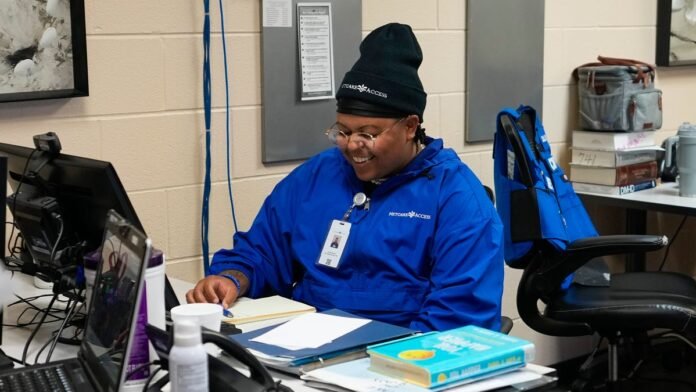Dee Dill loves his job because it involves a lot of listening to familiar experiences.
As a peer support specialist on the Community Mobile Team, Dill’s job is to address mental health crises in real time. He can empathize with what people are going through and wants to give them the same care that got him to a place healthy enough to help them.
“We can step into their shoes for a moment, meet them where they are at, and we can walk with them through this,” Dill said.
The Community Mobile Team, a mental health crisis response team, is a pilot program of mental health nonprofit Netcare Access, which receives funding from the Franklin County Alcohol, Drug and Mental Health Board.
Mental health crisis teams are increasingly common in partnerships with law enforcement. Netcare Access has been operating under an independent model since early 2023, following previous work with law enforcement, and has already helped hundreds of people in need.
“When (George) Floyd happened, there was definitely a different response in the community at that point. They said, ‘Hey, we want a response from outside the police,'” said Shawn Daniels, a licensed social worker and the mobile crisis manager of the team. . “So there were definitely some shifts in the ways that we wanted to be able to continue to provide (mental health) services to the community.”
Serving Franklin County, the program consists of physicians and peer support specialists – individuals with experience working with mental health and substance use issues. It is intended to divert calls about mental health and substance use crises from law enforcement agencies to trained professionals.
More: Central Ohio’s 988 hotline calls to increase in 2024 with people seeking mental health help
They go wherever someone is having a crisis, whether it’s at home, at a gas station or in a park, and help him or her get both immediate and continued care.
“Everyone’s story is different, and we meet all these different types of people every day, and the end goal is still to be loving and kind and support our community,” Dill said.
What does one of the team’s crisis calls look like?
When the team is called, the first priority is information, such as the location and type of crisis. Depending on the situation, they may be able to collect information about the individual, from a Medicare record or from Netcare Access records if they are a current or past customer.
The team then gathers the appropriate resources for the specific crisis and enters a discreet, unlabeled car, so as not to attract unnecessary attention.
On site, the doctor and peer support specialist work together to get the person to the other side of the crisis, determining whether or not they need to be hospitalized or can remain in the community. If they are able to stay, they will be connected to resources such as outpatient therapy, support groups and more. If not, they are taken to an intensive care location.
According to Netcare Access, around 51% of calls end with a person staying in the community. They are then monitored to ensure they continue with care. Of the dozens of monthly calls, on average only one required additional police support.
“They want you to get better.”
From its founding in 2023 through September, the team has served more than 1,000 people in Franklin County experiencing trauma, mental health or substance use crises. These cases span a wide range of experiences, including overwhelming anxiety, drug overdoses, psychosis, or suicidal ideation.
Anne Rogers is one of those 1,000. Chronic physical and mental illness, conflict with loved ones and the loss of a job prompted her to call 988 after having suicidal thoughts. An operator suggested that the Community Mobile Team visit her.
The team was friendly, courteous and non-invasive, Rogers said. She said she was initially reluctant to leave her apartment to seek further care for her crisis, but the validation and vulnerability of a peer support specialist who shared their own experiences encouraged her to step outside her comfort zone and reach out for help. get what she needed.
“I think it’s fair to say that the people that are there, they care about you and they want to see you thrive,” Rogers said. “They want to see you get better. They don’t want to see you struggle. They understand that life is hard.”
How to access the community mobile team
If you are experiencing a mental health crisis, you can receive a response from the mobile team by calling 988 or the NetCare Access crisis line at 614-276-2273. The services are 100% free, Daniels said.
Further instructions and details on what to expect and how to prepare for a phone call can be found on the Netcare Access website.
If you are interested in becoming a peer support specialist, you can find more information on the Ohio Department of Mental Health and Addiction Services website.
“We are always here and we are always ready to respond to the crisis, whatever it is,” Daniels emphasizes.
Samantha Hendrickson is The Dispatch’s medical affairs and healthcare reporter. She can be reached at shendrickson@dispatch.com





